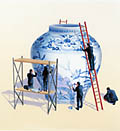 About F&D Subscribe Back Issues Write Us Copyright Information Democratic Republic of Timor-Leste and the IMF |
How Will the Macroeconomy Be Managed in an Independent East Timor? An East Timorese View José Ramos Horta and Emilia Pires
On August 30, 1999, the people of East Timor won the world's admiration for their commitment to democracy. More than 98 percent of registered voters defied intimidation to cast their ballots in an orderly and peaceful manner, voting overwhelmingly for independence from Indonesia. The discipline, patience, and dignity displayed on that day will continue to be a hallmark of East Timor after it has completed its transition to full independence. In our long struggle for independence, we have had to face hard and sometimes painful choices. In order to establish a sound macroeconomic framework for our new country, more hard choices will need to be made. Again, the world will see East Timor unflinchingly choose to do not what is expedient for the moment but what is right for the future development of the nation. Already the majority East Timorese Cabinet of the United Nations Transitional Administration has endorsed policies establishing a framework for macroeconomic stability. Measures to increase revenue by instituting a fair taxation regime and reducing the inflated civil service that was a legacy of the previous administration have demonstrated our adherence to principles of prudent fiscal management. The U.S. dollar has been adopted as the official currency for the transition period. These principles will be further advanced after the transition, as East Timor demonstrates its commitment to sustainability in building a sound fiscal framework underpinned by a stable, credible currency. Any future moves to establish a national currency will include efforts to ensure it has strong financial backing and the credibility necessary to be welcomed by international financial markets. An independent East Timor will have a lean, cost-effective government that will seek to keep aggregate expenditures aligned with the economy's absorptive capacity. Domestic revenue sources are expected to provide a solid foundation for financing the country's recurrent budget without recourse to donor assistance. Already, despite the massive devastation of its infrastructure and disrupted trade systems that East Timor has had to cope with, it is well on the way to exceeding the $17 million in revenues projected for the current fiscal year. For the medium term, projected oil and gas exports from the Timor Gap (the expanse of ocean between northern Australia and the island of Timor) are highly promising, and this export income may be supplemented by earnings from other successful oil and gas exploration and the resulting concessions, as well as from exports of marble and other hard-rock minerals. East Timor has been judicious in its allocation of Timor Gap receipts. Similarly, it should be feasible for East Timor to invest any windfalls from energy exports in, for example, an endowment fund. Such a fund could act as a stabilizing force, safeguarding income from resource sales that rightly belongs not only to East Timorese citizens of today but also to their children and grandchildren. Three-fourths of our population is engaged in agriculture. Traditionally, these farmers have employed a risk-minimizing strategy to reduce their vulnerability to economic shocks rather than a riskier, income-maximizing strategy. A posttransition East Timor will strengthen traditional agriculture by using low-technology inputs to increase crop yields. Providing access to rural banking and microcredit facilities will increase this sector's output growth and improve its ability to market surpluses and build linkages to the private sector. Achieving sustained economic growth will be essential to rural development in East Timor. Given the country's overwhelmingly young population, attaining sustained growth will be crucial. To reach this goal, East Timor will do all that is necessary to enable the private sector to thrive. An independent East Timor will encourage private sector development. East Timor's beautiful tropical climate will be matched by an equally attractive investment climate, with appropriate laws protecting property rights and contracts, establishing a fair commercial code, codifying labor relations, and minimizing the costs of doing business. From previous administrations, we have already learned much about market-distorting practices, such as collusion, corruption, and nepotism. We have repeatedly declared our commitment to seeing this legacy eradicated. A posttransition East Timor will welcome sound investments by firms that wish to operate in an environment free of artificial barriers to trade. We expect that all stakeholders in our society will embrace the values that have guided the East Timorese liberation struggle for the past twenty-five years: transparency, mutual respect, and equality of treatment. In an independent East Timor, financial rewards will not depend on race, religion, or political party membership, or on whom you know or where you live but rather on individual initiative and hard work.
|